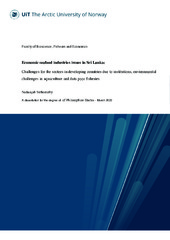| dc.contributor.advisor | Arne, Eide | |
| dc.contributor.author | Nadarajah, Suthamathy | |
| dc.date.accessioned | 2022-09-06T06:40:25Z | |
| dc.date.available | 2022-09-06T06:40:25Z | |
| dc.date.embargoEndDate | 2027-09-23 | |
| dc.date.issued | 2022-09-23 | |
| dc.description.abstract | The thesis focuses on three specific challenges for the seafood industry: (1) the quality and capacity of national institutions; (2) the importance of environmental factors for aquaculture production; and (3) how to monitor and, hopefully, manage fisheries with few and uncertain observations (data-poor fisheries). Each challenge has been studied empirically using proper methodologies and presented in individual papers. | en_US |
| dc.description.doctoraltype | ph.d. | en_US |
| dc.description.popularabstract | This thesis focuses on the importance of some of these factors. The first factor studied is the role of institutions in aquaculture production (Paper 1). This was studied by analysing the relationship between the annual growth rate in aquaculture production of the major aquaculture producing countries and the quality of institutions in those countries over the last three decades (1984–2013) using econometric models. The second factor studied is the environmental challenges, i.e. how a changing climate may affect aquaculture production in the Asian region (Paper 2). The study analyses the vulnerability and resilience of fresh and brackish water aquacultures, mainly carp, tilapia, catfish, gourami, shrimp, crayfish, and crab production in major Asian producing countries. The third factor is related to fisheries and the lack of information about their stock status of fisheries. How can crucial information be obtained from data-poor fisheries (Paper 3) from a management perspective? The stock status of major Indian ocean fisheries has been evaluated using a proposed simple stock assessment method.
The main findings of the three papers are to be used to discuss the growth and development of Asian seafood production and Sri Lankan seafood industry from a future perspective. | en_US |
| dc.description.sponsorship | UiT | en_US |
| dc.identifier.isbn | 978-82-8266-230-7 | |
| dc.identifier.uri | https://hdl.handle.net/10037/26650 | |
| dc.language.iso | eng | en_US |
| dc.publisher | UiT The Arctic University of Norway | en_US |
| dc.publisher | UiT Norges arktiske universitet | en_US |
| dc.relation.haspart | <p>Paper I: Nadarajah, S. & Flaaten, O. (2017). Global aquaculture growth and institutional quality. <i>Marine Policy, 84</i>, 142–151. Also available at <a href=https://doi.org/10.1016/j.marpol.2017.07.018>https://doi.org/10.1016/j.marpol.2017.07.018</a>. Accepted manuscript version available in Munin at <a href=https://hdl.handle.net/10037/12559>https://hdl.handle.net/10037/12559</a>.
<p>Paper II: Nadarajah, S. & Eide, A. (2020). Are Asian fresh and brackish water aquaculture production vulnerable or resilient towards climate change impacts? <i>Aquaculture Economics & Management, 24</i>(3), 232–254. Published version not available in Munin due to publisher’s restrictions. Published version available at <a href=https://doi.org/10.1080/13657305.2019.1677802>https://doi.org/10.1080/13657305.2019.1677802</a>. Accepted manuscript version available in Munin at <a href=https://hdl.handle.net/10037/16828>https://hdl.handle.net/10037/16828</a>.
<p>Paper III: Nadarajah, S. & Eide, A. A simple method of evaluating the state of data-poor fisheries: Exemplified by major Indian Ocean fisheries. (Manuscript). | en_US |
| dc.rights.accessRights | embargoedAccess | en_US |
| dc.rights.holder | Copyright 2022 The Author(s) | |
| dc.rights.uri | https://creativecommons.org/licenses/by-nc-sa/4.0 | en_US |
| dc.rights | Attribution-NonCommercial-ShareAlike 4.0 International (CC BY-NC-SA 4.0) | en_US |
| dc.subject | VDP::Social science: 200::Economics: 210 | en_US |
| dc.subject | VDP::Samfunnsvitenskap: 200::Økonomi: 210 | en_US |
| dc.title | Economic seafood industries issues in Sri Lanka: Challenges for the sectors in developing countries due to institutions, environmental challenges in aquaculture and data poor fisheries | en_US |
| dc.type | Doctoral thesis | en_US |
| dc.type | Doktorgradsavhandling | en_US |


 English
English norsk
norsk


